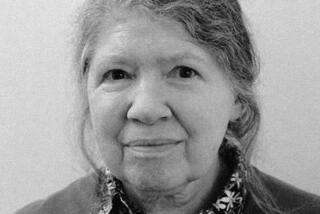‘A Voyage Round John Mortimer’ by Valerie Grove
- Share via
June 25, 2008
Emotionally, William Butler Yeats was a 19th century man, and so his famous dictum that the creative soul must seek “perfection in the life or in the work” once seemed not only practical but also wise.
What would the arch-poet have made, one wonders, of that particularly 20th century sort of artist for whom the bitter chaos of a decidedly imperfect life is the stuff of which the whole work is made? Superb snob that he was, Yeats might well have recognized the inevitability of such an art in an era in which aristocracy and peasantry/proletariat were pushed to history’s margins and the sensibility of the self-absorbed upper middle classes emerged triumphant -- at least in the West.
Such thoughts circle rather naturally around Valerie Grove’s loosely jointed but engrossing biography of the British author and literary celebrity John Mortimer. Now 85, Mortimer is best known to American readers and public television viewers as the creator of Horace Rumpole, the indomitable Old Bailey hack, the very soul of every English barrister or American lawyer who ever has gloried in the honorific “counsel for the defense.” Real Mortimer fans also will recall his two superb novel-length comedies of manners -- “Paradise Postponed” and “Titmuss Regained” -- which eviscerated the popular conservatism of the Thatcher/Reagan era.
In Britain, Mortimer is one of those self-willed characters who has passed into national treasure status. Since the 1950s, though, he’s been one of the country’s most recognized literary personalities -- a celebrated playwright (accounted part of the “new wave” with John Osborne and Harold Pinter), a novelist, screenwriter, liberal political commentator (he long has reveled in the “Champagne socialist” label) and acclaimed memoirist, as well as barrister, who has won a succession of important free speech and civil rights cases. (He once defended the Sex Pistols’ right to use “bollocks” on an album cover.) Along the way, he has fathered five children with two wives and a mistress and played stepfather to three more.
Grove’s biography does a dogged job of locating the origins of all this frenetic creativity -- of both sorts -- in Mortimer’s tumultuous personal life: first in his deeply but burdensomely affectionate relationship with his father, a celebrated probate and divorce attorney who carried on his practice even after going blind in middle age, then in Mortimer’s tormented 22-year marriage to novelist Penelope Fletcher Mortimer, best known for her harrowing accounts of domestic life in “The Pumpkin Eater” and “Daddy’s Gone A-Hunting.” (Mortimer’s second and current wife also is named Penelope, though she is called “Penny.”)
Much of Grove’s account is taken up with the fecund domestic warfare between Mortimer and his first wife. Both would derive much of their work directly from their internecine strife. From the beginning of their marriage, Mortimer was a serial philanderer and Penelope was bitter, unfaithful, depressed and unwilling to let go -- as was he. English reticence keeps it all from being a soap opera, but nothing can make it anything but unlovely. Penelope’s novels are exquisitely drawn testaments to that.
John Mortimer is a fascinating writer with an equally intriguing -- if stomach-churning -- life. That alone makes “A Voyage Round John Mortimer” compelling reading, which is good, since Grove does rather less than one would hope to help. Among other things, she has an unhappy tendency to veer toward the demotic:
“At this point, the bewitching Mrs. Dimont [Penelope’s first married name] reenters the narrative: the dark beauty whom John had fleetingly seen that day when he and Michael Fenton went from Oxford to visit Charles Dimont at the Boar’s Hill cottage named the Butts, Penelope, her ready-made family and her already complicated history, was destined to be the next most significant person in John’s life.”
Grove’s attention to that word “narrative” can be irritatingly spotty. One of this book’s strengths is the author’s access to the late Penelope Fletcher Mortimer’s diaries, but out of some inexplicable motive, those firsthand observations emerge sporadically -- and often distant by pages or even chapters from the episode they describe.
Given Penelope’s lacerating candor, that’s worse than a confusing disappointment. Few authors of either gender have written as affectingly about marital discord or destructive love as Penelope Mortimer did in her novels and stories. “A Voyage Round John Mortimer” would have been enhanced immeasurably if Grove had made better and more extensive use of the raw material from which those books were made.
Grove does rise to the occasion when it comes to two of the troubling mysteries in Mortimer’s long and involved life. One has to do with whether or not he was aware that his affair with actress Wendy Craig -- begun, naturally, while she was appearing in one of his plays -- had produced a son, Ross. Mortimer has claimed that he was unaware of the boy’s existence until Craig “came to Turville Heath Cottage for lunch, in September 2004, and told John that Ross, now aged 42, was his son.”
Grove points out, however, that Penelope surely knew, since she incorporated the events in “The Pumpkin Eater,” and “unless John willfully ignored the story” in that novel “he would surely have known. His family and many friends agreed that he must have had some inkling. In several of his later works . . . there is a son whose true paternity is in some doubt.”
The other issue has to do with Mortimer’s role in the celebrated 1981 adaptation of Evelyn Waugh’s “Brideshead Revisited” for Britain’s Thames Television, which subsequently became a major event on American public television. That adaptation is rightly regarded as one of the finest ever done from a major work of literature, and Mortimer is credited as the screenwriter. Three years ago, however, an earlier biography revealed that virtually nothing of Mortimer’s work made it onto television and that most of the work was done by the producer and director. Grove gives an excellent and entirely credible account of how that occurred.
Mortimer accepted the “Brideshead” assignment at an exceptionally busy time -- he had more Rumpole and a television life of Shakespeare in the works, as well as the Sex Pistols obscenity case to try. Nevertheless he delivered the six episodes requested.
“Brideshead,” as Grove points out, “was not his favorite Waugh novel. He disliked Waugh’s attitude to the General Strike and the patronizing of Rex Mottram.” Still, as Mortimer himself said, “I had grown up in much the same way as Waugh: a middle-class boy, born to hard professional work, educated above our stations slightly, falling half in love, at Oxford, with a more effete and useless way of life.”
Whatever, the reason, Mortimer’s adaptation was slap-dash and off-key. Rewrites didn’t help, and, when a second director convinced his backers to expand the series to 13 hours over 11 episodes, director, producer and even cast cooperated in taking the script back to Waugh’s original -- which is, of course, its genius. Mortimer was shown what amounted to rushes and heartily agreed on the strategy.
So why did his credit survive? Thames’ negotiations with the Waugh estate had been difficult. The heirs maintained the right to approve the screenwriter, and Mortimer had been their choice. Chuck him and the deal was off. So Mortimer was paid handsomely for 13 hours of adaptation and subsequently “fell into the habit of purring modestly and murmuring, ‘It was Evelyn Waugh’s script, really.’ ”
For better or worse, something similar can be said for the life of John Mortimer, which has proceeded exactly according to his script, really.
A Voyage Round John Mortimer A Biography of the Creatorof Rumpole of the BaileyValerie GroveViking: 542 pp. $27.95
More to Read
The biggest entertainment stories
Get our big stories about Hollywood, film, television, music, arts, culture and more right in your inbox as soon as they publish.
You may occasionally receive promotional content from the Los Angeles Times.










